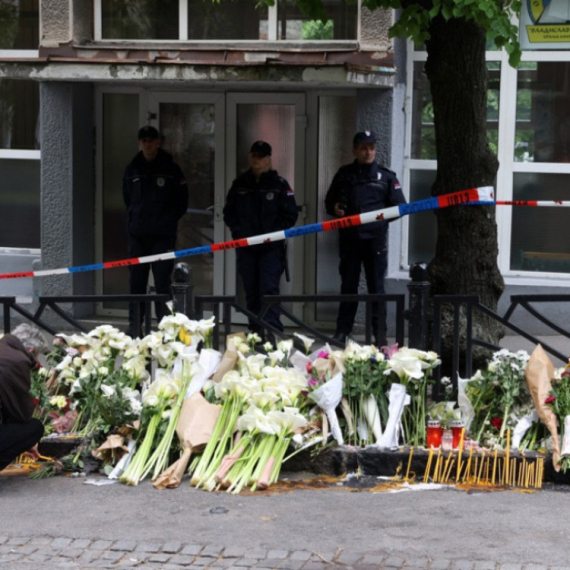British PM promises referendum on EU in 2017
British Prime Minister David Cameron has promised in a long-awaited speech to hold a referendum by the end of 2017 at the latest.
Wednesday, 23.01.2013.
13:32

LONDON British Prime Minister David Cameron has promised in a long-awaited speech to hold a referendum by the end of 2017 at the latest. He said the referendum would be held if the Conservatives won the next general election. British PM promises referendum on EU in 2017 The speech, which has been in the planning for six months, had been scheduled for last Friday in the Netherlands, but was postponed because of the Algerian hostage crisis. Cameron warned that Britain, the world’s sixth economic power, could leave the EU if the Union did not make key reforms. Cameron ended months of speculation by announcing in a speech the plan for a vote sometime between 2015 and the end of 2017, shrugging off warnings that this could imperil Britain's economic prospects and alienate its biggest trading partner, Reuters has reported. The British PM stressed that if new relations between the EU and his country were established, he would be “more than happy to advocate that the country stay in the Union”. However, Cameron did not spell out what powers he would like to see the Britain take back as part of a new settlement or what would happen if the negotiations did not go his way. He said "disillusionment" with the EU was "at an all time high" and "simply asking the British people to carry on accepting a European settlement over which they have had little choice" was likely to accelerate calls for Great Britain to leave. According to the PM, many British citizens feel like the EU is meddling in their everyday life, imposing unnecessary rules and regulations. “It is time for the British people to have their say," he said. “And when we have negotiated that new settlement, we will give the British people a referendum with a very simple in-or-out choice to stay in the EU on these new terms; or come out altogether. It will be an in/out referendum," Cameron noted. Commenting on claims that calling of the referendum would be irresponsible and that it would bring insecurity to the business atmosphere and question Great Britain’s place in the EU, he said that a problem could not be solved by ignoring it. “If we do not face these challenges, there is a danger or Europe crumbling and the British people will head toward the exit,” Cameron explained. The EU, according to him, needs to be based on flexibility, strengthening, democratic responsibility and fairness. Cameron noted that the main reason Britain had to reconsider its relations with the EU was eurozone’s debt crisis. He assessed that new relations between his country and the EU should be based on a joint market. Cameron has been under pressure of euroskeptics in his Conservative Party who want him to stand up to the EU. Recent polls show that British citizens are in favor of their country leaving the EU, mainly because of Brussels’ meddling with internal issues. European officials have already warned London that it has no right to treat the EU the way it sees fit and to use advantages provided by the membership while shunning its obligations. U.S. President Barack Obama told Cameron last week that the U.S. “wanted strong Britain in the strong EU”. David Cameron (Beta/AP) Tanjug
British PM promises referendum on EU in 2017
The speech, which has been in the planning for six months, had been scheduled for last Friday in the Netherlands, but was postponed because of the Algerian hostage crisis.Cameron warned that Britain, the world’s sixth economic power, could leave the EU if the Union did not make key reforms.
Cameron ended months of speculation by announcing in a speech the plan for a vote sometime between 2015 and the end of 2017, shrugging off warnings that this could imperil Britain's economic prospects and alienate its biggest trading partner, Reuters has reported.
The British PM stressed that if new relations between the EU and his country were established, he would be “more than happy to advocate that the country stay in the Union”.
However, Cameron did not spell out what powers he would like to see the Britain take back as part of a new settlement or what would happen if the negotiations did not go his way.
He said "disillusionment" with the EU was "at an all time high" and "simply asking the British people to carry on accepting a European settlement over which they have had little choice" was likely to accelerate calls for Great Britain to leave.
According to the PM, many British citizens feel like the EU is meddling in their everyday life, imposing unnecessary rules and regulations.
“It is time for the British people to have their say," he said.
“And when we have negotiated that new settlement, we will give the British people a referendum with a very simple in-or-out choice to stay in the EU on these new terms; or come out altogether. It will be an in/out referendum," Cameron noted.
Commenting on claims that calling of the referendum would be irresponsible and that it would bring insecurity to the business atmosphere and question Great Britain’s place in the EU, he said that a problem could not be solved by ignoring it.
“If we do not face these challenges, there is a danger or Europe crumbling and the British people will head toward the exit,” Cameron explained.
The EU, according to him, needs to be based on flexibility, strengthening, democratic responsibility and fairness.
Cameron noted that the main reason Britain had to reconsider its relations with the EU was eurozone’s debt crisis.
He assessed that new relations between his country and the EU should be based on a joint market.
Cameron has been under pressure of euroskeptics in his Conservative Party who want him to stand up to the EU.
Recent polls show that British citizens are in favor of their country leaving the EU, mainly because of Brussels’ meddling with internal issues.
European officials have already warned London that it has no right to treat the EU the way it sees fit and to use advantages provided by the membership while shunning its obligations.
U.S. President Barack Obama told Cameron last week that the U.S. “wanted strong Britain in the strong EU”.



























































Komentari 7
Pogledaj komentare